Paradiso (Amsterdam)
Paradiso is a Dutch music venue and cultural centre located in Amsterdam.
| Paradiso | |
|---|---|
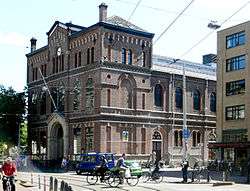 Paradiso | |
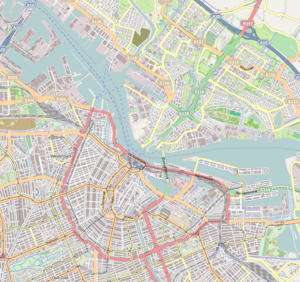 Location in Amsterdam | |
| General information | |
| Status | music venue |
| Address | Weteringschans 6-8, Amsterdam |
| Country | |
| Coordinates | 52°21′44″N 4°53′02″E |
| Opened | 30 March 1968 |
| Other information | |
| Seating capacity | 1,500 (main hall) 250 (upper floor stage) |
| Website | |
| www | |
History
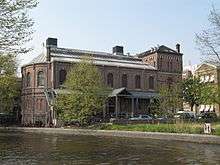
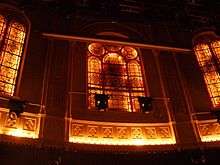
It is housed in a converted former church building that dates from the nineteenth century and that was used until 1965 as the meeting hall for a liberal Dutch religious group known as the "Vrije Gemeente" (Free Congregation).[1] It is located on de Weteringschans, near the Leidseplein, one of the nightlife and tourism centers of the city. The main concert hall in the former church interior has high ceilings and two balcony rings overlooking the stage area, with three large illuminated church windows above the stage. The acoustics are rather echoey, but improvements have been made over the years. In addition to the main concert hall, there are two smaller cafe stages, on an upper floor and in the basement.
Paradiso was squatted by hippies in 1967 who wanted to convert the church to an entertainment and leisure club. The police ended the festivities the same year. In 1968, the city opened Paradiso as a publicly subsidized youth entertainment center. Along with the nearby Melkweg (Milky Way), it soon became synonymous with the hippie counterculture and the rock music of that era. It was one of the first locations in which the use and sale of soft drugs was tolerated. From the mid-1970s, Paradiso became increasingly associated with punk and new wave music, although it continued to program a wide variety of artists. Starting in the late 1980s, raves and themed dance parties became frequent.
In 1994, Paradiso, along with the Institute for Sonology and The ArtScience Interfaculty (Amsterdam), initiated Sonic Acts together. In recent years, the venue has settled into an eclectic range of programming, which, besides rock, can include lectures, plays, classical music, and crossover artists. Long associated with clouds of tobacco and hashish smoke, Paradiso banned smoking in its public areas (except for a small smoking room) in 2008 in accordance with a nationwide ban on smoking in public venues.
The acts
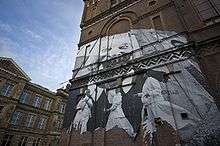
Artists who have recorded or filmed concerts at the Paradiso include Blondie, The Jam, The Police, Prince, The Killers, Pink Floyd, David Bowie, The Sex Pistols,[2] The Rolling Stones, Madonna, Amy Winehouse, Nirvana,[3] Joe Jackson, Lady Gaga, Westlife, Coldplay, Herman Brood, Red Hot Chili Peppers, Laibach, U2, Pearl Jam, Metallica, Joy Division, Johnny Thunders, Patti Smith Group,[4] John Cale, Chic, Chris Isaak, Kaizers Orchestra, Kraftwerk,[5] Talking Heads,[6] Omar & the Howlers, The Undertones,[7] Smoosh, Duran Duran, Blancmange,[8] The Cure, Golden Earring,[9] Adele, Willie Nelson, Dexter Gordon, Phish, Arcade Fire, Nightwish, Bad Brains, Kayak, Loudness, Soft Machine, The Sound, Emilíana Torrini, Link Wray, Lenny Kravitz, The Only Ones, Nick Cave and the Bad Seeds, Electrosexual, Beth Hart, Dayna Kurtz, Dave Matthews, Suzanne Vega, Fiction Plane, Epica, Editors, Motorpsycho, Pain of Salvation, Deftones, Riverside, Lamb, Live, NITS, Jamiroquai, Ken Stringfellow, Public Enemy and The Roots, The Proclaimers, Esperanza Spalding.
Glen Matlock played his last gig with the Sex Pistols at Paradiso on 7 January 1977 until the reunion in 1996.[10]
On 23 May 1968, Pink Floyd performed a concert at the club venue containing songs from The Piper at the Gates of Dawn and A Saucerful of Secrets. The recording of "Interstellar Overdrive" can be found on the compilation album Cre/ation: The Early Years 1967–1972.
On 26–27 May 1995, The Rolling Stones played two semi-acoustic concerts at the Paradiso. Scalped tickets reportedly sold for many thousands of dollars. Recorded tracks from these concerts were released on the Stones' Stripped album later that year. Keith Richards said that the Paradiso concerts were the best live shows the Stones ever did.
Gallery
 Cansei de Ser Sexy performing in the main hall
Cansei de Ser Sexy performing in the main hall Ayọ concert on September 13, 2007
Ayọ concert on September 13, 2007 Pink Floyd performing at the Paradiso on 23 May 1968.
Pink Floyd performing at the Paradiso on 23 May 1968..jpg) Standing Ovation For Patti Smith - Gallery
Standing Ovation For Patti Smith - Gallery
Future
In the 1990s, the future of Paradiso became something of a political issue in Amsterdam, since there was some political resistance to the continuation of the subsidies that allowed the venue to operate in its central city location.[11] More recently, supporters have successfully argued that the Paradiso subsidy is reasonable in comparison with subsidies given to other performance venues.
References
- "Vrije Gemeente Amsterdam – Centrum voor vrije religie en levensbeschouwing". vrijegemeente.nl (in Dutch).
- SexPistolsArchives, Sex Pistols - Satellite - Paradiso - Amsterdam, 5th January 1977, retrieved 2019-01-23
- Gulennur Boz, Nirvana Live At Paradiso 11/25/91 (Full), retrieved 2019-01-23
- setlist.fm ~ Patti Smith Group at Paradiso, Amsterdam 1976-October-09th
- Live and Loud! ~ Kraftwerk at the Paradiso Amsterdam 1976-September-11th
- Live and Loud! ~ Talking Heads at Paradiso Amsterdam 1978-January-14th
- Live and Loud! ~ The Undertones at Paradiso Amsterdam, Netherlands 1980-March-15th
- Live and Loud! ~ Blancmange at the Paradiso Amsterdam 1983-April-09th
- "Paradiso". amsterdamsights.com. n.d. Retrieved 13 March 2018.
- "God Save The Sex Pistols - Day By Day: 1977 Part One". www.philjens.plus.com. Retrieved 2019-01-23.
- "Brief met noodkreet bezorgd op Amsterdamse Stadhuis - Toekomst Paradiso is zorgwekkend". volkskrant.nl (in Dutch).
Further reading
- Converted Churches. Tectum Publishers, Antwerp, Belgium 2007, 178-183. ISBN 978-90-76886-44-2
External links
![]()
- Official website (in Dutch)
- Viberate profile